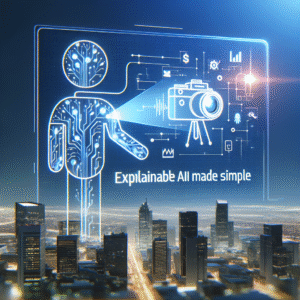What do you think the future holds for blockchain innovations? It’s fascinating to consider how a technology that was once associated primarily with cryptocurrency has grown to encompass various sectors and applications. In this discussion, I’m excited to share insights into the future of blockchain and how it could continue to reshape industries around the world.
Understanding Blockchain Technology
Before diving into future innovations, it’s essential to recap what blockchain is. At its core, blockchain is a distributed ledger technology that allows data to be stored across multiple computers. This ensures that records are immutable and transparent, making it a reliable way to store and share information.
The Basics of Blockchain
In simpler terms, you can think of blockchain as a digital chain of blocks. Each block contains a list of transactions, and once a block is filled, it is added to the chain in a way that is permanent. This decentralized structure allows everyone on the network to have access to the same information, which minimizes fraud and increases accountability.
The Evolution of Blockchain
As more people understand blockchain technology, it has evolved from a simple means to secure transactions in cryptocurrencies to a multifaceted tool that has potential applications across various industries.
Early Adaptations
Originally designed to support Bitcoin, blockchain gained popularity as people recognized its potential beyond cryptocurrencies. The technology started to be used in supply chain management, healthcare, and finance, paving the way for innovative solutions that aim to enhance efficiency and transparency.
Recent Advancements
In the past few years, developments like smart contracts and decentralized applications (dApps) have emerged. Smart contracts are self-executing contracts with the terms of the agreement written directly into code. dApps run on a blockchain network rather than a centralized server, allowing for decentralized governance.
Future Innovations in Blockchain
The next few years promise to bring even more creative use cases for blockchain technology. I’d love to highlight a few areas where I believe we will see significant progress.
Enhanced Security
Security is a growing concern for many organizations. Blockchain’s nature of being decentralized and immutable makes it a strong contender for creating secure environments. With advancements in encryption techniques and multi-signature wallets, blockchain applications will likely be more secure than ever.
The Potential Impact of Enhanced Security
| Industry | Potential Application |
|---|---|
| Financial | Secure banking transactions with multi-signatures. |
| Healthcare | Safeguarding patient data and health records. |
| Supply Chain | Authenticating product origins and reducing fraud. |
Improved Supply Chain Tracking
The supply chain industry has already begun adopting blockchain for better transparency and efficiency. I see the future holding even more advanced tracking systems that will allow consumers to trace the journey of products from origin to shelf.
Use of Blockchain in Supply Chain
| Supply Chain Stage | Current Challenges | Blockchain Solution |
|---|---|---|
| Manufacturing | Lack of transparency in sourcing | Immutable records of product origin |
| Distribution | Tracking delays | Real-time updates accessible to all parties |
| Retail | Issues with counterfeit products | Provenance tracking via blockchain |
Tokenization of Assets
Tokenization refers to the process of converting real-world assets into digital tokens on a blockchain. This practice can democratize investment opportunities by allowing fractional ownership of high-value assets, such as real estate or artwork.
Benefits of Asset Tokenization
Here are a few advantages that immediate come to mind:
- Liquidity: Tokenization can make illiquid assets more tradable and accessible.
- Transparency: Ownership history is recorded on a public ledger, reducing the risk of fraud.
- Inclusivity: More people can invest in large assets through fractional ownership.
Decentralized Finance (DeFi)
One of the most exciting developments in the blockchain world is the rise of Decentralized Finance (DeFi). This ecosystem uses smart contracts to recreate traditional financial systems positively and transparently.
Key Features of DeFi
DeFi platforms allow users to lend, borrow, and trade assets without relying on traditional banks or financial institutions. Here are some features I find particularly intriguing:
- Accessibility: Anyone with an internet connection can participate, breaking down barriers to entry.
- Lower Fees: By eliminating intermediaries, users can often save on unnecessary fees.
- Innovative Products: DeFi fosters the development of new financial instruments that can meet diverse needs.
What the Future Holds for DeFi
As DeFi continues to mature, I anticipate further regulatory clarity and improved user interfaces. The blending of traditional finance and blockchain could lead to more secure and efficient markets.
Blockchain in Healthcare
The healthcare sector stands to benefit significantly from blockchain innovations. One key area is the management of patient data and clinical trials.
Secure Patient Data Management
Imagine being able to control your own health records, sharing them easily with healthcare providers whenever you wish. Blockchain can facilitate this through secure, patient-centered systems.
Advantages of Blockchain in Healthcare
| Benefit | Description |
|---|---|
| Patient Control | Patients can grant access to their records. |
| Data Interoperability | Different systems can communicate seamlessly. |
| Reduced Fraud | Immutable records reduce chances of tampering. |
Clinical Trials and Research
Utilizing blockchain in clinical trials could ensure that data is secure and transparent, thus enhancing trust in the results. I see the future of clinical research embracing blockchain to manage patient recruitment, consent, and data management.
Blockchain for Identity Verification
Identity theft is a growing concern globally. Blockchain can introduce secure ways to verify identities, offering a more reliable way for individuals to manage their personal data.
The Future of Identity Verification
In a blockchain-based identity system, users control their own data, which can be shared securely with trusted parties. This method can drastically reduce instances of identity fraud.
Benefits of Blockchain-Based Identity Management
| Benefit | Description |
|---|---|
| Enhanced Privacy | Users can selectively share information. |
| Reduced Fraud Risk | Immutable records lower identity theft occurrences. |
| Streamlined Processes | Faster verification through decentralized systems. |
Environmental Impact of Blockchain
As the world becomes increasingly focused on sustainability, blockchain innovations may also play a crucial role in addressing environmental concerns.
Energy Efficiency of Blockchain Networks
One concern about blockchain technology has been its energy consumption, particularly with proof-of-work systems like Bitcoin. However, several newer blockchain systems are utilizing proof-of-stake and other energy-efficient mechanisms.
Future Directions
I see the potential for substantial improvements in the energy consumption of blockchain systems as more sustainable practices are implemented, including:
- Networking using renewable energy sources.
- Incentivizing energy-efficient behaviors among miners.
Blockchain and Government Services
The adoption of blockchain by governments could revolutionize public service delivery. From voting to land registration, the possibilities seem endless.
E-Governance and Transparency
By utilizing blockchain, governments could improve transparency and reduce corruption by making records more accessible to the public.
Potential Applications in Government
| Service | Potential Improvement |
|---|---|
| Voting | Secure, fraud-proof election processes. |
| Land Registration | Immutable, easily accessible property records. |
| Public Records Management | Streamlined access for citizens and officials. |
Challenges Facing Blockchain Adoption
Despite the promising aspects of blockchain, there are still significant challenges that I believe need to be addressed for widespread adoption.
Regulatory Concerns
Governments worldwide are still figuring out how to regulate blockchain technology. Striking the right balance between fostering innovation and protecting consumers will be crucial.
Scalability
As more users adopt blockchain applications, scalability becomes crucial. Many current networks struggle to handle a large volume of transactions efficiently.
User Experience
For mass adoption to occur, blockchain applications must also provide a user-friendly experience. Complicated interfaces can deter average users from engaging with the technology.
Conclusion
Looking ahead, I can’t help but feel excited about the future of blockchain innovations. As I’ve discussed, there are vast possibilities across various sectors: from improving security and creating decentralized finance to transforming healthcare and enhancing government services.
While challenges remain, I believe the potential benefits of blockchain will drive continued innovation. By addressing regulatory concerns, improving scalability, and focusing on user experience, the technology stands poised to create positive changes in our society.
As a passionate observer of technology, I find blockchain’s journey fascinating. I’m eager to see how this technology continues to evolve and inspire new solutions in the years to come. What are your thoughts on the future of blockchain? Are there specific innovations you’re looking forward to seeing? I’d love to hear your perspective!






